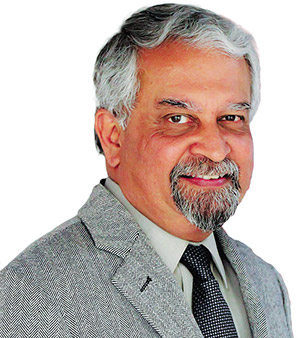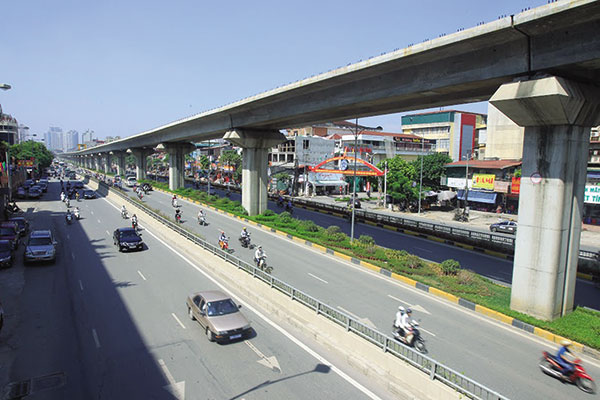For the UNDP, Vietnam a model of growth
 |
Since Doi moi in 1986, Vietnam has achieved a significant transformation of its economic structure. As part of this process, it successfully integrated with the global economy, adopting a socialist-oriented market economy with state-owned enterprises.
Also as part of this process, Vietnam has been trying to move from resource based and low skilled labour intensive production to medium and high technology production as a result of its economic restructuring. Progress on this front has been very limited, however, because of a number of supply side constraints such as the quality and skills of its human capital, the state of infrastructure and many enabling environment policy constraints. While strong political commitment and the full support of economic and social stakeholders have significantly contributed to this reform process, political reforms to enable economic and social reforms have been gradual and need to be accelerated to enable the next necessary phase of economic and social transformation. This will not be possible without bolder political reforms to create a more enabling environment.
More specifically, in the first phase of reforms, land reform provided for recognition by the state of private land use rights, the foreign investment law accelerated foreign direct investments, the company law acknowledged the recognition of private ownership, and the law on enterprises and the common law on investment created incentives for investors.
After establishing the legal framework to implement these structural reforms, the roles of state and the market were more effectively and efficiently balanced and defined. In this period, Vietnam also joined ASEAN, became a member of the World Trade Organization (WTO), and signed the now stalled Trans-Pacific Partnership agreement as well as bilateral and multilateral trade agreements that strengthened the trade liberalisation process and its integration with global markets.
In the period 1986-2008, GDP per capita increased more than fivefold increase since 1986 and reached $2,100 as a result of an average annual growth rate of 6.7 per cent which represented the third highest in the region(1), while poverty declined from 58 per cent in 1993 to around 7 per cent in 2015(2).
As of 2010, Vietnam was elevated from low income country to lower middle income country status as a result. However, in more recent years, economic growth has slowed and needs fresh sources of momentum. The acceleration of appropriate domestic political reforms will also be essential to ensure more rapid and sustainable economic growth and to allow Vietnam to adapt to the fast changing global economic landscape.
 |
| In Vietnam’s modern era the country has made admirable strides, and is now able to prepare for its next development leap |
While the Vietnamese economy has successfully integrated with global markets, this success has been largely fuelled by a combination of exports in low skilled labour intensive, natural resource and foreign direct investment (FDI) based sectors(3). However, even though FDI based exports contribute the lion’s share in total exports, they are based on limited backward linkages in the domestic economy.
This situation strongly signals that Vietnam cannot continue to implement its existing growth model if it wishes to enhance the future prospects of the country. A new growth model needs to be constructed that will focus especially on quality issues. More specifically, higher technological value-added, productive and dynamically competitive sectors need to be key ingredients of a new growth model. The government needs to take the necessary steps to strengthen these key qualitative dimensions of the domestic economy.
There are also challenges which the Vietnamese economy faces arising from shifts in the global technological frontier and the rise of automation which should be seriously considered. In that respect, necessary actions should be taken to increase human resource skills and the technological base. Only then will it be possible to increase the value-added share of Vietnamese companies in global value-chains.
Vietnam’s growth performance started to decelerate after the global economic crisis. After Doi moi, the welfare of society increased but with some distortions. As a result, while the Vietnamese economy has converged to the middle-income country grouping and the percentage of poor people has fallen to single digit levels, there are a significant number around 70 per cent of the population) whose income levels are very close to the poverty line. As a result, Vietnam needs to urgently implement structural reforms to further transform its economic structure through more productive and higher value added competitive sectors to create decent jobs so as to support its “missing middle” population and avoid the middle income trap in the future. Institutional reforms in the fields of public administration, public investment, and state-owned enterprises (SOEs) are among those which will need to be accelerated to address existing distortions in the economy.
There have also been significant changes in the fundamentals of the global economy after the global economic crisis and Vietnam needs to adapt herself to this changed environment proactively. As a result, legal frameworks need to be introduced that will empower the role of an independent and robust private sector in the economy to create a productive and competitive market structure.
In this context, the role of state needs to change to focus on establishing and providing an effective regulatory and supervisory framework with greater emphasis on transparency. These measures, taken together, will lead to more robust, inclusive and sustainable economic growth.
UNDP will continue to support the reform process. The existing reform agenda is examined and a number of policy recommendations were made in UNDP’s last National Human Development Report (NHDR) for Vietnam.
To follow through on these recommendations, a recently initiated study will analyse, the productivity and competitiveness structure of Vietnam’s economy by examining backward and forward linkages in value chains.
By doing so, the weakest and the strongest components of different sectors and their value-added capacity will be determined and necessary policies designed and implemented to increase their productivity and strengthen their competitive power.
Through another UNDP study, more appropriate and integrated economic models will be developed for the Vietnamese economy in order to strengthen the intellectual capacity of the relevant ministries and the national statistical institute. Through this study, national modelling and statistical capacity will be strengthened and policy options, based on more rigour and analysis, should underpin the government’s future policy decisions.
Through yet another UN program, implementation of the Sustainable Development Goals (SDGs) will be supported and reported through the Voluntary National Review (VNR) which will be presented at the UN’s High Level Political Forum on the SDGs in July 2018 in New York and through Vietnam’s national 2018 SDG report. The UN will continue to play a key support role at various levels in Vietnam’s VNR preparation process. The SDGs can be an appropriate platform for Vietnam to show her visionary
perspective through strategically-designed and well-implemented structural policies which serve to fulfil the 2030 Agenda.
Vietnam’s recent experience has been remarkable for its simultaneous achievements of a dramatic reduction of poverty, sustained high economic growth rates and high levels of exports which together have contributed to its economic and social transformation from an impoverished, war-devastated country to a modern and dynamic society in just a generation. However, this transformation can only be sustained and taken to the next level if there is a consistent and simultaneous implementation of higher value-added productivity, appropriate institutional strengthening and governance policies.
The UN will be pleased to continue to play a key role in this process. We are celebrating the 40th Anniversary of Vietnam joining the UN in 2017 and it is clear that the UN has played a very special, indeed unique role in contributing to Vietnam’s successful trajectory over the last 40 years.
I expect our engagement with the Government of Vietnam to continue to strengthen during its development journey over the coming decades.
What the stars mean:
★ Poor ★ ★ Promising ★★★ Good ★★★★ Very good ★★★★★ Exceptional
Latest News
More News
- Masan Consumer names new deputy CEO to drive foods and beverages growth (February 23, 2026 | 20:52)
- Myriad risks ahead, but ones Vietnam can confront (February 20, 2026 | 15:02)
- Vietnam making the leap into AI and semiconductors (February 20, 2026 | 09:37)
- Funding must be activated for semiconductor success (February 20, 2026 | 09:20)
- Resilience as new benchmark for smarter infrastructure (February 19, 2026 | 20:35)
- A golden time to shine within ASEAN (February 19, 2026 | 20:22)
- Vietnam’s pivotal year for advancing sustainability (February 19, 2026 | 08:44)
- Strengthening the core role of industry and trade (February 19, 2026 | 08:35)
- Future orientations for healthcare improvements (February 19, 2026 | 08:29)
- Infrastructure orientations suitable for a new chapter (February 19, 2026 | 08:15)
















 Mobile Version
Mobile Version